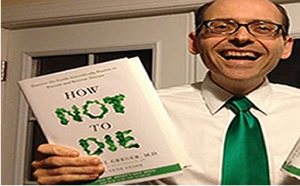 When it comes to the health benefits of a plant-based lifestyle, Dr. Michael Greger is an encyclopedia of knowledge. A doctor, lecturer and founder of NutritionFacts.org, he’s an invaluable resource for shooting down the many misconceptions about a veg diet.
When it comes to the health benefits of a plant-based lifestyle, Dr. Michael Greger is an encyclopedia of knowledge. A doctor, lecturer and founder of NutritionFacts.org, he’s an invaluable resource for shooting down the many misconceptions about a veg diet.
Dr. Greger just released a compellingly titled new book: How Not to Die. In it, he talks about how the vast majority of premature deaths can be prevented with a whole foods, plant-based diet, and outlines some of the most important items we should all be eating. It’s a fascinating read for anyone who wants to live longer — and isn’t that everyone?
To help you on the path to a better life, Dr. Greger has shared three of his top tips. Follow his instructions, and you’ll be that much closer to centenarian status.
1. Eat more beans!
The many benefits of beans are one of the key takeaways from Greger’s book, he says.
“Sadly 96% of Americans don’t even reach the minimum recommended intake of three servings a week. I’m more inclined to agree with the American Institute for Cancer Research’s suggestion of three servings a day, beans, split, peas, chickpeas or lentils with every meal.”
While people may balk at the idea of beans for breakfast, a lot of cultures include beans in traditional morning meals, from England to Japan to India. “Legume intake may be the most important dietary predictor of survival in older people from around the globe, with an 8% reduction in risk of premature death for every one ounce increase in daily intake,” he adds.
2. Eat more greens!
Most people realize that greens are good for you, but how good? “Eating greens nearly every day may be one of the most powerful steps you can take to prolong your life,” says Greger. “Of all the food groups analyzed by a team of Harvard University researchers, greens turned out to be associated with the strongest protection against major chronic diseases, including up to about a 20 percent reduction in risk for both heart attacks and strokes for every additional daily serving.
In addition, cruciferous veggies (broccoli, Brussels sprouts, cauliflower, collards, etc.) may help protect against breast cancer, says Greger, citing a study of 50,000 women that found that broccoli was especially protective among premenopausal women, and collard greens across all ages.
“You can also fight the blues with greens—frequent vegetable consumption may cut the odds of depression in half, and the nitrates in greens can also boost athletic performance and sexual function by boosting blood flow (the ‘veggie viagra’ effect).”
3. Eat more berries!
Berries are another key food focus in How Not to Die. They protect against cancer (chapters four, 11, and 13), boost the immune system (chapter 5) protect the liver liver (chapter 8), and benefit the brain (chapters 3 and 14).
“For example, Harvard researchers found that women who consumed at least one serving of blueberries and two servings of strawberries each week had slower rates of cognitive decline—by as much as two and a half years—compared with those who didn’t eat berries,” says Dr. Greger. “These results suggest that simply eating a handful of berries every day, one easy and delicious dietary tweak, may slow your brain’s aging by more than two years. Berries in all their colorful, sweet, and flavorful glory are protective little anti- oxidant powerhouses.”
He also cites an American Cancer Society study of nearly 100,000 men and women that found people who ate the most berries appeared significantly less likely to die of cardiovascular disease.
And all of the above foods are as delicious as they are healthy (of course, awesome recipes help, so check out our library).
In the words of Dr. Greger: “Wait a second—tastes great and may help you live longer? Yes. That’s what plant-based eating is all about!”
Want to know more? You can order How Not to Die online.
